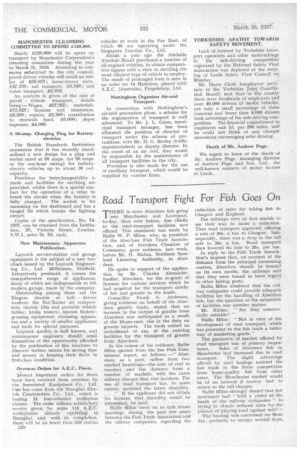Road Transport Fight For Fish Goes On THERE is more
Page 30

If you've noticed an error in this article please click here to report it so we can fix it.
Aberdeen fish going 1 into Manchester and Liverpool, to-day, than ever before, due chiefly to the road-transport facilities now offered. This statement was made by Bailie W. P. Milne, who, as president of the Afierdaen Fish Trade Association, and of Aberdeen Chamber of Commerce, gave evidence, last week, before Mr. H. Riches, Northern Scotland Licensing Authority, in Aberdeen.
He spoke in support of the application by Mr. Charles Alexander, haulier, Aberdeen, for the re-grant of licences for various services which he had acquired for the transport chiefly of fish and granite to the south.
Councillor Frank S. Anderson, giving evidence on behalf of the Aberdeen granite trade, stated that an increase in the output of granite from Aberdeen was anticipated as a result of the 10-per-cent, rise in the duty on granite imports. The trade wished no curtailment of any of the existing facilities for the transport of granite fromAberdeen.
In the course of his evidence, Bailie Milne quoted from the Sea Fish Commission report, as follows: —" Aberdeen, as a port, suffers from two marked handicaps-the cost of Coal to trawlers and the distance from a number of markets, with the extra railway charges that this involves. The use: of road transport has, to some extent, modified the latter disability. . ." If the applicant did not obtain his licences, that disability wotild, be intensified, he said.
Bailie Milne Went on to talk "about
• meetings during the past few years between the Fish Trade Association and the railway companies, regarding the
reduction of rates for taking fish to Glasgow and England.
The railways were at first unable to see their way to make a reduction. Then road transport appeared, offering a rate of 30s. a ton to Glasgow. Subsequently, there was a drop in the rail rate to 28s. a ton. Road transport then lowered its rate to 25s, per ton.
In reply to the Fish Trade Association's request that, on account of the distance from the principal consuming centres, Aberdeen should be treated on its own merits, the railways said that they were hound to have regard to other fishing ports.
Bailie Milne admitted that the railway companies could provide adequate facilities for the handling of Aberdeen fish, but the question of the suitability of facilities was another matter.
Mr. Riches: " Are they commercially suitable? "
Bailie Milne: "Not in view of the development of road transport, which has presented to the fish trade a better way of marketing goods." The guarantee of market offered by road transport was of primary impor•
tance. Sales of Aberdeen fish • to Manchester had increased due to road transport. The slight advantage offered, by road haulage assisted the fish trade in the fierce competition from lesser-quality fish from other areas. The Manchester market would be of no interest if traders had to returnto the rail charges.
Bailie Milne strongly deniedthat fish merchants 'had " held a 'pistol atthe heads of the railway COrnpanies ". tryingto obtain. reduced rates by.' the
procesS of -playing road agai;n6t ) Thehearing was -contimied:on day,' 'probably to occupy several' days,




















































































